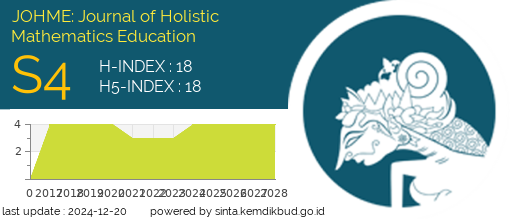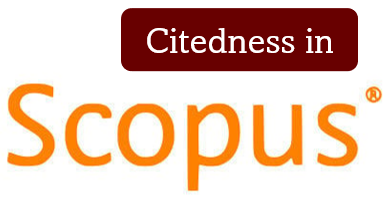THE EFFECT OF TEACHER LEADERSHIP AND STUDENT MOTIVATION THROUGH COLLABORATIVE LEARNING ON STUDENTS' COGNITIVE ABILITIES AT XYZ PRIMARY SCHOOL
DOI:
https://doi.org/10.19166/johme.v6i2.5834Keywords:
teacher leadership, student motivation, collaborative learning, cognitive abilityAbstract
During the COVID-19 pandemic, students were educated via online learning. Teachers and students around the world faced considerable challenges in coping with the sudden shifts in teaching and learning methods. In facing this challenge, teachers were required to be creative leaders in their teaching approach. Both teachers and students had to adapt quickly to change. One way to make learning more enjoyable and interesting is through collaborative learning. During online learning, teachers may use the Breakout Room feature of the Zoom application for collaborative learning. Teacher leadership and student motivation are two important elements in sustaining collaborative learning. The purpose of this quantitative study was to examine the effect of teacher leadership and student motivation through collaborative learning on the cognitive abilities of students at XYZ Elementary School. Thirty-six grade six students completed the online questionnaire. Research calculations using path analysis through the PLS SEM software were used to test the proposed hypothesis. The results showed that teacher leadership had a positive effect on collaborative learning and students' cognitive abilities. It was also found that student motivation had a positive effect on collaborative learning and students' cognitive abilities. Finally, collaborative learning has a positive impact on students’ cognitive abilities.
BAHASA INDONESIA ABSTRACT: Dalam masa pandemi COVID-19, siswa harus melalui pendidikan mereka dengan pembelajaran daring dan pembelajaran jarak jauh. Guru dan siswa di seluruh dunia mengalami tantangan yang cukup berat untuk mengatasi perpindahan metode pembelajaran dan pengajaran yang mendadak. Dalam menghadapi tantangan ini, guru dituntut untuk menjadi pemimpin yang kreatif dalam mengajar dan para guru dan siswa harus cepat beradaptasi dengan perubahan. Salah satu cara untuk membuat pembelajaran menjadi lebih menyenangkan adalah melalui pembelajaran kolaboratif. Pembelajaran kolaboratif dalam pembelajaran daring dapat menggunakan fitur Breakout Room dari aplikasi Zoom. Kepemimpinan guru dan motivasi siswa adalah dua elemen penting dalam keberlangsungan dan keberhasilan pembelajaran kolaboratif. Tujuan dari penelitian kuantitatif ini adalah untuk menguji pengaruh kepemimpinan guru dan motivasi siswa melalui pembelajaran kolaboratif terhadap kemampuan kognitif siswa di Sekolah Dasar XYZ. Tiga puluh enam siswa SD Kelas 6 menyelesaikan kuesioner online. Perhitungan penelitian menggunakan analisis jalur melalui metode PLS SEM digunakan untuk menguji hipotesis yang diajukan. Hasil penelitian menunjukkan bahwa kepemimpinan guru berpengaruh positif terhadap pembelajaran kolaboratif dan kemampuan kognitif siswa. Ditemukan juga bahwa motivasi siswa berpengaruh positif terhadap pembelajaran kolaboratif dan kemampuan kognitif siswa. Hasil terakhir adalah pembelajaran kolaboratif berdampak positif terhadap kemampuan kognitif siswa
References
Agustin, Y. T., Gunanto, Y. E., & Listiani, T. (2017). Hubungan motivasi belajar dan disiplin belajar siswa kelas IX pada pembelajaran matematika di suatu sekolah Kristen. JOHME: Journal of Holistic Mathematics Education, 1(1), 32-40. https://doi.org/10.19166/johme.v1i1.716
Anderson, L. W., & Krathwohl, D. R. (2001). A taxonomy for learning, teaching, and assessing: A revision of Bloom’s taxonomy of educational objectives. New York, NY: Longman.
Aslan, S., Nugroho, B. S., Ramli, M., & Rusiad. (2020). Teacher’s leadership teaching strategy supporting student learning during the Covid-19 disruption. Jurnal Manajemen Pendidikan Islam 28(3), 321-333. Retrieved from https://e-journal.ikhac.ac.id/index.php/nidhomulhaq/article/view/984/531
Asterhan, Christa, S. C., & Schwarz, B. B. (2016). Argumentation for learning: Well-trodden paths and unexplored territories. Educational Psychologist, 51(2), 164-187. https://doi.org/10.1080/00461520.2016.1155458
Bakar, N. A., Basri, R., & Fooi, F. S. (2015). Hubungan kepimpinan guru dengan pencapaian akademik pelajar. International Journal of Education and Training (InjET), 1(2), 1-11. Retrieved from http://www.injet.upm.edu.my/images/journal/issue2/Hubungan%20Kepimpinan%20Guru%20dengan%20Pencapaian%20Akademik%20Pelajar.pdf
CNN Indonesia. (2021). Mengenal learning loss, kondisi yang ditakutkan Nadiem. Retrieved from https://www.cnnindonesia.com/gaya-hidup/20210922183800-284-698049/mengenal-learning-loss-kondisi-yang-ditakutkan-nadiem
Duncan, T. G., & McKeachie, W. J. (2005). The making of the motivated strategies for learning questionnaire. Educational Psychologist, 40(2), 117-128. https://doi.org/10.1207/s15326985ep4002_6
Fauziah, F. (2021). Implementasi pembelajaran kolaboratif menggunakan breakout room zoom meeting pada pembelajaran jarak jauh. EDUTECH: Jurnal Inovasi Pendidikan Berbantuan Teknologi, 1(3), 226-232. https://doi.org/10.51878/EDUTECH.V1I3.683
Gat, H. T. S., Kosasi, S., & Sulastri, K. (2021). The Influence of grit on students’ academic achievement: Mediated by online learning. 2021 9th International Conference on Cyber and IT Service Management, CITSM 2021. https://doi.org/10.1109/CITSM52892.2021.9587922
Gulo, A., Mahulae, S., Anzelina, D., & Silaban, P. J. (2020). Pengaruh kepemimpinan guru terhadap hasil belajar siswa di kelas IV SD tahun pembelajaran 2020/2021. Jurnal Educatio FKIP UNMA, 6(2), 339-343. https://doi.org/10.31949/EDUCATIO.V6I2.495
Hartnett, M. (2016). The importance of motivation in online learning. In Motivation in Online Education, 5-32. https://doi.org/10.1007/978-981-10-0700-2_2
Jamaris, M. (2013). Orientasi baru dalam psikologi pendidikan. Bogor, Indonesia: Ghalia.
Kurniawan, R. Y. (2016). Identifikasi permasalahan pendidikan di Indonesia untuk meningkatkan mutu dan profesionalisme guru. Konvensi Nasional Pendidikan Indonesia VIII. Retrieved from https://www.researchgate.net/publication/317184069_IDENTIFIKASI_PERMASALAHAN_PENDIDIKAN_DI_INDONESIA_UNTUK_MENINGKATKAN_MUTU_DAN_PROFESIONALISME_GURU
Law, N., Yuen, A., & Fox, R. (2011). Educational innovations beyond technology: Nurturing leadership and establishing learning organizations. New York, NY: Springer.
Manan, U. A., & Narimo, S. (2018). Efektivitas rencana pelaksanaan pembelajaran matematika berbasis konstruktivisme di sekolah menengah pertama. Jurnal Varidika, 29(2), 158-167. https://doi.org/10.23917/varidika.v29i2.5631
Ng, P. M. L., Chan, J. K. Y., & Lit, K. L. (2022). Student learning performance in online collaborative learning. Education and Information Technologies, 27(6), 8129-8145. https://doi.org/10.1007/S10639-022-10923-X
Nguyen, D., Harris, A., & Ng, D. (2020). A review of the empirical research on teacher leadership (2003-2017): Evidence, patterns and implications. Journal of Educational Administration, 58(1), 60-80. https://doi.org/10.1108/JEA-02-2018-0023
Nieto-Márquez, N. L., GarcÃa-SinausÃa, S., & Nieto, M. A. P. (2021). Links between motivation and metacognition and achievement in cognitive performance among primary school pupils. Anales de Psicologia, 37(1), 51-60. https://doi.org/10.6018/analesps.383941
Öqvist, A., & Malmström, M. (2018). What motivates students? A study on the effects of teacher leadership and students’ self-efficacy. International Journal of Leadership in Education, 21(2), 155-175. https://doi.org/10.1080/13603124.2017.1355480
Patandung, A., & Saragih, M. J. (2020). Peran guru kristen dalam menumbuhkembangkan kepercayaan diri siswa dalam pembelajaran matematika. JOHME: Journal of Holistic Mathematics Education, 3(2), 180-199. https://doi.org/10.19166/johme.v3i2.1972
Santrock, J. W. (2018). Educational psychology (6th ed.). New York, NY: McGraw-Hill Education.
Schunk, D. H., Meece, J. R., & Pintrich, P. R. (2014). Motivation in education: Theory, research, and applications (4th ed.). Upper Saddle River, NJ: Pearson.
Silalahi, J. (2019). The effects of collaborative learning models on engineering mechanics learning outcomes. Journal of Physics: Conference Series, 1387(1), 1-6. https://doi.org/10.1088/1742-6596/1387/1/012086
Sugiyono. (2017). Metode penelitian kuantitatif, kualitatif, dan R & D. Bandung, Indonesia: Alfabeta.
Sukma, V. M. (2022). Motivasi belajar: Analisis motivasi belajar siswa dengan kemampuan kognitif yang tinggi di kelas 3C MIN 1 Kota Malang. Ibtidaiyyah: Jurnal Pendidikan Guru Madrasah Ibtidaiyah, 1(1), 63-77. Retrieved from http://urj.uin-malang.ac.id/index.php/ijpgmi/article/view/1068/745
Summers, J. J. (2006). Effects of collaborative learning in math on sixth graders’ individual goal orientations from a socioconstructivist perspective. The Elementary School Journal, 106(3), 273-290. https://doi.org/10.1086/501487
Tohidi, H., & Jabbari, M. M. (2012). The effects of motivation in education. Procedia: Social and Behavioral Sciences, 31, 820-24. https://doi.org/10.1016/j.sbspro.2011.12.148Downloads
Additional Files
Published
How to Cite
Issue
Section
License
Authors who publish with this journal agree to the following terms:
1) Authors retain copyright and grant the journal right of first publication with the work simultaneously licensed under a Creative Commons Attribution License (CC-BY-SA 4.0) that allows others to share the work with an acknowledgement of the work's authorship and initial publication in this journal.
2) Authors are able to enter into separate, additional contractual arrangements for the non-exclusive distribution of the journal's published version of the work (e.g., post it to an institutional repository or publish it in a book), with an acknowledgement of its initial publication in this journal.
3) Authors are permitted and encouraged to post their work online (e.g., in institutional repositories or on their website). The final published PDF should be used and bibliographic details that credit the publication in this journal should be included.”










